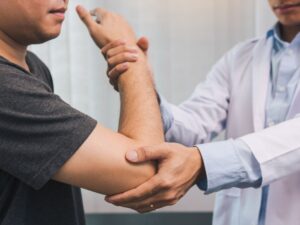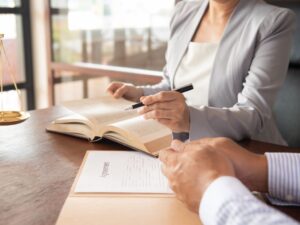Navigating the open waters can be an exhilarating experience, but like all adventures, it comes with its share of risks. Boating accidents, although unexpected, are a reality that many water enthusiasts might face. Being prepared and knowing the right course of action can not only save lives and streamline the post-accident process, from medical concerns to legal matters. In the aftermath of such an incident, swift decisions can be critical.
Regan Zambri Long, a legal specialists in boating accidents, can help you turn a daunting situation into a manageable one, ensuring safety, compliance, and peace of mind.
If you or a loved one have been injured in a boating accident, the personal injury attorneys of Regan Zambri Long are here for you.
Contact Us Today to Schedule
a Free Consultation
According to the United States Coast Guard, there were over 4,000 boating accidents from 2021 to 2022. When you find yourself in the midst of a boating accident, your immediate response can greatly influence the outcomes for everyone involved. Panic is a natural reaction, but having a set plan can counteract this instinct, allowing you to act rationally and effectively.
 might mean moving to a stable part of the boat, grabbing flotation devices, or even preparing to abandon the boat if it’s sinking. If anyone is injured, tend to them immediately. Every boat should have a first aid kit onboard, and knowing basic first aid can make a significant difference. If injuries are severe, focus on stabilizing the individual until professional help arrives.
might mean moving to a stable part of the boat, grabbing flotation devices, or even preparing to abandon the boat if it’s sinking. If anyone is injured, tend to them immediately. Every boat should have a first aid kit onboard, and knowing basic first aid can make a significant difference. If injuries are severe, focus on stabilizing the individual until professional help arrives.
You’ll also want to write down or record the weather conditions at the time of the accident, the state of the water (calm, choppy, etc.), and any visible obstructions or hazards. These can play a role in determining the cause and responsibility of the accident.
As the initial shock of the accident subsides, it’s crucial to remain calm, think clearly, and methodically go through these steps. They not only ensure immediate safety but also set the foundation for any necessary legal or insurance actions that might follow.
Once immediate safety concerns are addressed, it becomes crucial to officially report the accident. Reporting isn’t just about complying with laws; it provides an official account that can be essential for insurance claims and potential legal matters.
Properly reporting a boating accident might seem tedious in the wake of the incident, but it’s a responsibility that carries significant weight. It helps authorities track and analyze boating incidents, potentially leading to safer boating regulations and practices in the future. Moreover, accurate and prompt reporting safeguards your interests in any subsequent legal or insurance processes.
The aftermath of a boating accident doesn’t end with immediate response and reporting. Both the legal and insurance aspects can be complex, but with the right approach, you can smoothly navigate these waters, ensuring that your rights are protected and you receive any compensation you may be entitled to.

Be sure to familiarize yourself with your insurance policy’s specific terms, including your coverage limits, deductibles, and any exclusions. This will give you a clearer picture of what to expect regarding repairs, medical expenses, or other damages. This will also help you decide if you need legal representation.
In cases where there’s significant damage, injury, or potential legal culpability, having legal representation can be invaluable. They can guide you through the claims process, negotiate with insurance companies, and represent you if there are lawsuits.
With a track record in boating accident cases, the team at Regan Zambri Long provides specialized knowledge and experience. Engaging a firm with such a niche specialization can greatly increase your chances of a favorable outcome.
Once you’ve gone through the initiation reporting steps, provide your insurance company with all relevant details of the accident, including photographs, witness accounts, and the official accident report.
It’s not uncommon for insurance companies to contest claims, minimize damage assessments, or delay compensation. Understanding these tactics and having legal representation can counter such challenges effectively.
Many boating accident claims end in settlements rather than court trials. This involves negotiating an agreed-upon compensation amount. Ensure any settlement covers all your damages, including potential future medical expenses or boat repairs.
Boating accidents are distressing events, and their aftermath can be a maze of legal and insurance issues. However, with due diligence, awareness of your rights, and possibly the guidance of seasoned professionals like those at Regan Zambri Long, you can confidently traverse this phase, ensuring justice and fair compensation.
The condition of your boat post-accident is not only a matter of financial concern but also a safety imperative. Before returning to the waters, it’s critical to address all damages and ensure that your vessel is seaworthy.
Regardless of the accident’s magnitude, always have your boat checked by a professional. Some damages, especially those related to the boat’s structure or vital systems, might not be immediately visible.
Beyond just physical damage, ensure the boat’s safety systems, including fire extinguishers, life vests, and emergency signaling devices, are intact and functional.
When calculating damages in a boating accident, approach reputable boat repair services for detailed quotes. Multiple quotations can give you a better understanding of the true repair costs and serve as a benchmark during insurance negotiations.
Your insurance company will likely send an adjuster to assess the damage. They’ll provide an estimate which, in some cases, might be lower than your received quotations. Remember, you have the right to contest undervalued estimates, especially if backed by professional repair quotes.
While some insurance policies might suggest or mandate specific repair shops, it’s often in your best interest to select a trusted and experienced service provider. Their work quality can significantly influence your boat’s future performance and safety.
The aftermath of a boating accident can be overwhelming, with the focus often on immediate safety and legal concerns. However, the condition of your boat is of paramount importance. By diligently assessing damages, working effectively with your insurance, and ensuring all repairs are top-notch, you safeguard future boating experiences and protect the investment you’ve made in your vessel.
While it’s essential to navigate the aftermath of a boating accident, it’s equally crucial to look ahead and equip oneself with knowledge and tools to prevent future mishaps. The ocean, with its ever-changing moods, demands respect. You can ensure a safer boating experience going forward with the following:
The sea’s allure is undeniable, and while boating accidents are unfortunate, they can serve as a profound lesson. By investing in prevention and safety, not only do you ensure your well-being, but you also contribute to a safer marine environment for everyone. After all, being prepared is always better than being caught off-guard.
Boating accidents are unpredictable, distressing events that can leave lasting physical, emotional, and financial impacts. It’s crucial to remember that you don’t have to face these challenges alone. Legal intricacies can be overwhelming, and seeking rightful compensation can become a daunting task.
Regan Zambri Long, with their vast experience in boating accident cases, offers unparalleled legal expertise to guide and represent you. Their commitment to justice, combined with a deep understanding of marine laws and regulations, ensures that you are in capable hands, fighting for your rights.
Whether you’re dealing with insurance claims, facing potential litigation, or simply seeking advice on the best course of action post-accident, reach out to Regan Zambri Long. Their seasoned professionals are dedicated to providing the assistance you deserve, helping you restore peace and normalcy in your life.
Remember, while the waters might be unpredictable, your legal journey doesn’t have to be. Take the first step towards securing your rights and ensuring justice by contacting Regan Zambri Long today. Your well-being is their top priority.
For a no-obligation, free consultation, call or connect with us online today.